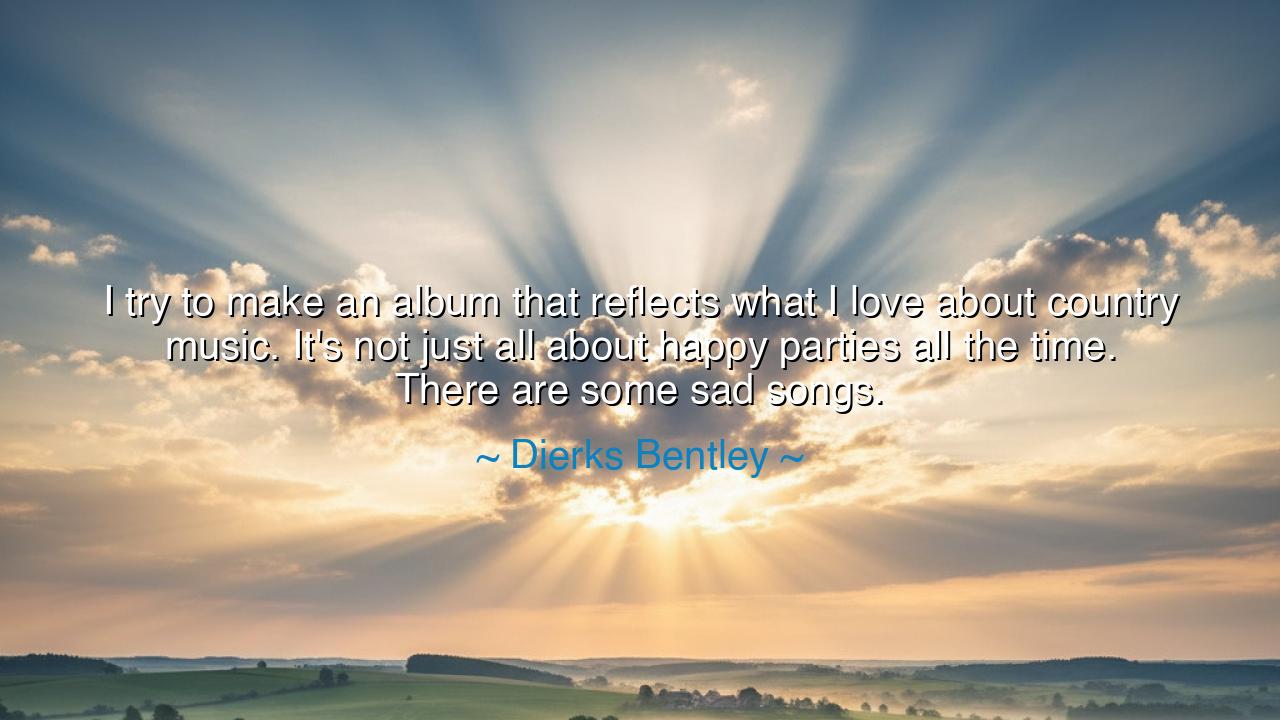
I try to make an album that reflects what I love about country
I try to make an album that reflects what I love about country music. It's not just all about happy parties all the time. There are some sad songs.






Listen well, O seekers of song and truth, to the words of Dierks Bentley, who has walked the long roads of melody and heartache. He declares: “I try to make an album that reflects what I love about country music. It’s not just all about happy parties all the time. There are some sad songs.” In these simple words lies a mighty teaching, for he reveals that music—like life—cannot be only a dance of joy, but must also carry the weight of sorrow, loss, and longing.
Mark well the first phrase: I try to make an album that reflects what I love. To reflect is to hold up a mirror, to catch the essence of a thing and show it true. Bentley does not seek merely to entertain, but to capture the spirit of country music, with its deep roots in the soil of struggle, heartbreak, and the endurance of the common soul. In this he echoes the wisdom of the ancients, who taught that art is not mere amusement, but a vessel of memory and truth.
Behold, then, the heart of his saying: not just all about happy parties. For what is life if painted only in bright colors? Such a life would be shallow, fragile, unable to withstand the storms that come to all men and women. To ignore sorrow is to deny half of existence. Bentley reminds us that true music—and true life—must embrace both laughter and tears, feasts and fasts, weddings and funerals. Only then does the song become whole, echoing the full breath of the human spirit.
And so he speaks of sad songs. Do not despise them, for they are companions on the road of grief. Just as the Psalms of old lifted cries of anguish alongside shouts of praise, so too do sad songs hold a sacred place. They remind the listener that they are not alone in their pain. In sadness shared through melody, there is healing; in sorrow voiced, there is strength. This is the power of music: to give voice to the unspeakable, to bind hearts together across distance and time.
Consider the story of the great bluesman Robert Johnson, who sang not of riches or triumph, but of loss, despair, and the restless soul. His songs, born of pain, carried across generations and became the roots of new music yet to come. What Johnson poured out in lament gave courage and catharsis to countless others. In like manner, Bentley acknowledges that the songs of sadness are not a weakness, but a foundation upon which joy itself stands.
The lesson is thus: embrace both the light and the shadow. Do not chase only the pleasures of life, nor flee the weight of sorrow. When you encounter grief, give it form—through words, through music, through honest expression—so that it may be carried more easily. And when you celebrate joy, let it be richer, fuller, because you have known the depths of mourning. To live only in cheer is to live shallow; to live in both cheer and sadness is to live deeply.
Therefore, take this counsel into your life: seek out the songs that mirror your soul. Do not fear to weep with them, nor to rejoice with them. In your own journey, strive to create—whether through music, or craft, or even daily deeds—works that reflect truth, not illusion. Speak with honesty, live with balance, and remember that a song of sorrow may carry more healing than a hundred songs of mirth. Thus will your life, like Bentley’s music, ring with authenticity and endure like a timeless melody.






AAdministratorAdministrator
Welcome, honored guests. Please leave a comment, we will respond soon